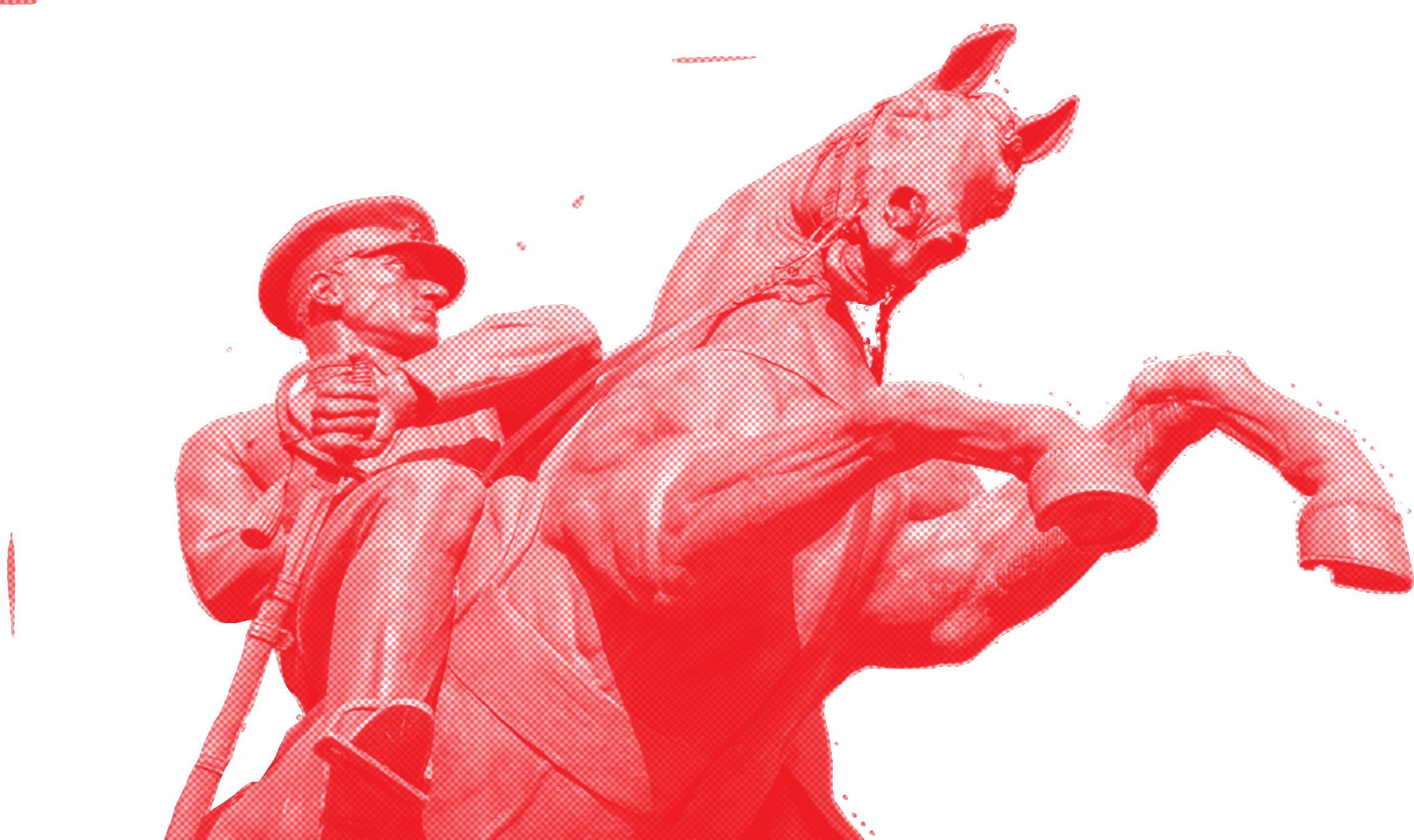
13 minute read
CONCLUSION
The relationship between Russia and Turkey is characterized by a complex mixture of cooperation and competition across the instruments of power. Both have been careful not to let competition escalate to conflict; pragmatism and compartmentalization of differences have been their watchwords. When attempting to predict the likely future trajectory of the relationship—a fraught endeavor even in less complex sets of ties—we need to look for areas of convergence and divergence in how their instruments of power interact.
In the diplomatic and political sphere, there is a high level of congruence and personal trust between Putin and
Advertisement
109 Bechev, Rival Power, p. 157. Erdogan, both of whom are authoritarian populists who see Western promotion of liberal democracy as a major threat to their hold on power.109 Both men lead political regimes focused on security and the preservation of their nations’ sovereignty, which they see as permanently under threat from the West. At the level of the international system, there is more room for competition. First, each has a historical mythology that emphasizes its great power status, and each has often been “the other” in these narratives. Next, both Moscow and Ankara are currently pursuing a “Eurasian” path, which stands in contrast to the so-called West, but, at the same time, each country defines itself as the natural leader of the Eurasian region, leaving room for competition between
them.110 Whether the convergence at the levels of individual leader and political regime can create enough stability to allow Russia and Turkey to successfully manage their differences at the geopolitical level remains to be seen. So far, they have managed to do so, and the personal trust between similar men who lead similar regimes has been a major reason. A sudden change in political leadership in either country might disrupt this balance and allow their competing geopolitical visions to play a greater role in their interaction.
The information instrument of power has been the most difficult to examine in this report. The data and frameworks available for analyzing how governments deploy information and discourse are less developed than those available for analyzing other instruments. Addressing this gap should be a focus of future political science research. Nevertheless, there is enough available to make inferences about how Russia and Turkey deploy information to advance their interests and what this means for their overall relationship. First, since both are authoritarian regimes, they exercise a higher level of control over their information environments than do democratic governments. Since the media in Russia and Turkey is less free than in advanced democracies, information in Russian and Turkish media is more likely to reflect government attitudes rather than shape them, as can be the case in advanced democracies. This characteristic endows Moscow and Ankara with an informational agility that Western governments often lack.
The Turkish shootdown of the Russian jet along the Syrian-Turkish border provides an example. Almost immediately after the incident, the rhetoric in government statements escalated quickly, and media in both countries followed suit. Each blamed the other for the incident and
110 Russia’s aspirations are grander here. It sees itself as the leader of all of Eurasia as it defines the region, while Turkey sees itself as the leader of the region’s Muslim states.

promised grave consequences. Less than a year later, discourse between the two governments experienced another about-face, with Erdogan apologizing for the incident and Putin reciprocating by expressing his support for Erdogan in the July 2016 coup attempt. Media in both countries again followed along and began emphasizing their friendship. Will the Russian and Turkish people continue to support the narrative propagated by the two governments and their allies in the media? This question is especially important if there are future incidents, and the narrative again shifts in a negative direction, then suddenly shifts back to a
President Putin and President Erdogan attend the MAKS-2019 air show in the Moscow. (kremlin.ru)
positive one. There is also the question of the personal effect of both leaders. To what extent does the current media attitude reflect the friendly relations between Putin and Erdogan? Would it change if relations between them soured?
A further possible complication in the information environment between Russia and Turkey is the role of religion. Religion is playing a larger role in the geopolitical identities of both countries, with Orthodoxy and its values becoming a major theme in how the Kremlin views the world111 and with Ankara increasingly moving in the direction of Islamism. Currently, the move toward greater religiosity in both countries is a factor that distinguishes them from the “secular and decadent” West. However, religious enmity between the two has often increased distrust and exacerbated the adversarial nature of the relationship. Since Orthodoxy and Islam have a long history of negative rhetoric toward the other, scholars and policymakers should be on the lookout for a rise in religious zeal and religious intolerance in the official discourse. While religion may not be the cause of a rupture in the relationship, it can be used to amplify differences and stoke passions if the relationship ruptures for other reasons.
111 For an examination of the role of Orthodoxy in the Russian military, and especially the strategic nuclear forces, see, Dimitry Adamsky, Nuclear Orthodoxy: Religion, Politics, and Strategy, (Palo Alto, CA: Stanford University Press, 2019).
Russian and Turkish deployment of the military instrument of power is the area where a rupture in RussianTurkish relations is most possible. Even though Moscow and Ankara have found themselves on different sides in multiple conflicts recently, including Syria, Libya, and Nagorno-Karabakh, they have managed to prevent the inevitable incidents from escalating to a general clash. But this is not a given going forward. After all, contingencies can happen on the ground (and in the air and at sea) where military forces are operating near one another. Contingencies can play an even larger role when professional military forces are working with and through local partners and proxies, who often have different goals than their sponsors and can be more risk tolerant.
Syria and the South Caucasus are the two areas where the risk of a military clash is highest. In Syria’s Idlib Province, which is controlled by a number of antigovernment groups, some of which are backed by Turkey, presents the highest risk. The Syrian regime—and possibly Russia—targeted Turkish forces in Idlib in early 2020, provoking a furious Turkish response that severely damaged the ground offensive power of the Syrian Army but carefully avoided targeting Russian troops. An early March summit between Putin and Erdogan de-escalated the situation and resulted in a fragile ceasefire that still holds. In the South Caucasus, the recent conflict between Armenia and Azerbaijan also raised military tensions between Moscow and Ankara, primarily because of the latter’s overt support for Azerbaijan. Turkey had long provided rhetorical support and sold weapons to Baku, but, in this round of the conflict, there is substantial evidence that it sent fighters from Syria and probably provided targeting support for the Azeri drones that inflicted huge damage to Armenia’s ground forces. Russia was forced to broker a ceasefire that acknowledged Azerbaijan’s military victory by returning to it much of the territory lost in the original war of 1989-1994. Some 2,000 Russian forces now keep a fragile peace in the region. Russia and Turkey have also disagreed over Ankara’s participation in the peacekeeping operation, with Turkey insisting it will deploy peacekeeping forces there and Russia responding that Turkish forces are only welcome as observers in the peacekeeping force headquarters, not as peacekeepers on the ground.
Economic interaction between Russia and Turkey has played a largely positive role and may have the capacity to act as a “shock absorber,” cushioning the impact of inevitable diplomatic and military incidents. Even in times of rising diplomatic and military tension, with the accompanying escalatory rhetoric between the governments, they have been careful to preserve some key elements of
their economic interaction. As two large, neighboring states whose trade largely consists of noncompeting goods, they are well positioned for further expansion of economic collaboration. Russia has historically held the dominant position in bilateral trade, but its dominance may be eroding as Turkey becomes a rising power in trade in services and an important energy storage and transport hub. The development of a more balanced economic relationship between Moscow and Ankara could increase the capacity of the relationship to absorb shocks caused by clashes in other areas since each side would have much to lose. Still, we are careful not to overestimate the ability of the trade relationship to prevent war as the historical record offers only qualified support here. Overall, Russia and Turkey appear poised to continue their recent trend of pragmatic cooperation and compartmentalization of their differences. Barring a sudden change in leadership in either country or a military clash that escalates too quickly for the two capitals to control, Western countries need to get used to dealing with a Turkey that remains a NATO member but cooperates with NATO’s original adversary. Managing the effects of the Russia-Turkey relationship on NATO and on stability in the wider Eurasian region will require patient and nuanced policy from Western governments. Policymakers in the West should understand that both Moscow and Ankara are ever-vigilant for supposed collusion between external and internal “enemies.” Both are obsessively prickly about guarding their sovereignty

Adobe Stock
against alleged interference from the West. To avoid activating fears of Western interference in Russian and Turkish internal politics, Western governments should moderate their rhetoric on these issues. This does not mean abandoning support for democracy and human rights, but it does mean taking Russian and Turkish expressions of concern for their sovereignty seriously, and not doing or saying things likely to exacerbate fears in Moscow and Ankara unless there is an important Western interest at stake.
Washington should look for a compromise with Turkey on Syria and the S-400 issue, which have been two of the thorniest issues in the bilateral relationship. In Syria, the United States should acknowledge Turkey’s fears about Kurdish militias along the Syrian-Turkish border, while preserving its support for the Syrian Democratic Forces, a Kurdish and Sunni Arab militia that liberated most of northern and eastern Syria from ISIS control. The United States should not allow its relationship with the SDF to rupture its relationship with Turkey, or abandon the SDF to more Turkish military attacks. A complete rupture with Turkey would be disastrous for NATO cohesion and the stability of the Black Sea region. Complete abandonment of the SDF would not only invite more fighting in northern and eastern Syria, but would also perhaps fatally undermine the model of using local ground forces supported by U.S. airpower, special forces, and other assets in conflicts where important— but not vital—interests are at stake. This would present the United States with the options of abandoning its interests to other actors in these conflicts or deploying U.S. ground forces in a fighting role, which would make it much more difficult for Washington to extricate itself.
The S-400 issue is marked by distrust on both sides. As noted earlier, many in Turkish government circles believe the United States is using the argument about the danger that the S-400 poses to the technology behind the F-35 as a fig leaf to disguise Washington’s political agenda. The real aim, they claim, is to keep Turkey under the U.S. thumb. U.S. experts, meanwhile, claim—even in private—that the technological issues of having both systems operating in Turkey are essentially insurmountable.112 Given these positions, it is in the U.S. interest to explain the technological challenges to the Turkish military and look for ways to overcome them while meeting Turkey’s air defense needs and keeping it in the F-35 program. This will not be easy; again, patience and nuance are required. One idea is a stringent, on-the-ground U.S. presence where Turkey’s F-35s and S-400s are based to ensure the two
112 Former U.S. government officials, conversation with one of the authors, February 5, 2021.
systems don’t interact.113 Another is a U.S. purchase of the S-400 from Turkey and its replacement with the U.S. Patriot missile system. Washington has floated versions of this idea before, but has always insisted that Ankara give up the S-400s without compensation.114 A U.S. purchase of the missile system might present a way forward that would prevent Ankara from feeling coerced and allow the United States to test the S-400 against the latest Western aircraft to better understand its strengths and it weaknesses.
What the West should not do is make “driving a wedge” between Russia and Turkey a policy objective. Attempts to do this would be transparent and would likely backfire. By treating both Moscow and Ankara as objects of Western policy instead of actors in their own right, the effect would likely drive them closer together. Instead, the West should focus on positive—not negative—policy objectives. The question should be how to advance Western relationships with key states in pursuit of well-defined policy objectives, not how to damage other states’ relationships with each other. The goal should be to stabilize Eurasia, not further destabilize it by setting two of its largest states against each other. Here, the focus should be on Turkey. Although Ankara has long been an unpredictable and sometimes troublesome ally, it is still an ally. NATO states have treaty commitments to Turkey and vice versa. If NATO is to continue to be the bulwark of stability and security that it has been for over 70 years, keeping Turkey as a committed member of the Alliance is critical. Its dalliances with Russia may be exasperating but are not likely to significantly undermine the security of NATO states or the cohesion of the Alliance. In contrast, Turkey’s exit from NATO or a formal alliance with Russia would certainly do so.
113 See, Aaron Stein and Robert Hamilton, “How America’s Experience With Pakistan Can Help it Deal With Turkey,” War on the Rocks, August 25, 2020, https://warontherocks.com/2020/08/how-americasexperience-with-pakistan-can-help-it-deal-with-turkey/, accessed March 9, 2021.
114 Tuvan Gumrukcu and Orhan Coskun, “Turkey says U.S. offering Patriot missiles if S-400 not operated,” Reuters, March 10, 2020, https://www.reuters.com/article/us-turkey-security-usaidUSKBN20X1I8, accessed March 9, 2021.
ABOUT THE AUTHORS

Colonel (Retired) Robert E. Hamilton, Ph.D., is an Associate Professor of Eurasian Studies at the U.S. Army War College and a Black Sea Fellow at the Foreign Policy Research Institute. In a 30year career in the U.S. Army, spent primarily as a Eurasian Foreign Area Officer, he served overseas in Saudi Arabia, Iraq, Germany, Belarus, Qatar, Afghanistan, the Republic of Georgia, Pakistan and Kuwait. He is the author of numerous articles and monographs on conflict and security issues, focusing principally on the former Soviet Union and the Balkans. He is a graduate of the German Armed Forces Staff College and the U.S. Army War College and holds a Bachelor of Science degree from the United States Military Academy, a Master’s Degree in Contemporary Russian Studies and a Ph.D. in Political Science, both from the University of Virginia.
@bobham88
Anna Mikulska, Ph.D., is a Senior Fellow at the Foreign Policy Research Institute and nonresident fellow in energy studies at the Baker Institute. She has written on the interplay between energy markets and policy and has a particular interest in U.S. and European energy policy. She also teaches graduate-level seminars on energy policy and geopolitics of energy at the University of Pennsylvania as a senior fellow for the Kleinman Center for Energy Policy. Mikulska holds a law degree from Adam Mickiewicz University, a master’s degree in international relations from the University of Windsor in Canada, and a Ph.D. in political science from the University of Houston.
@anna_b_mikulska

67



